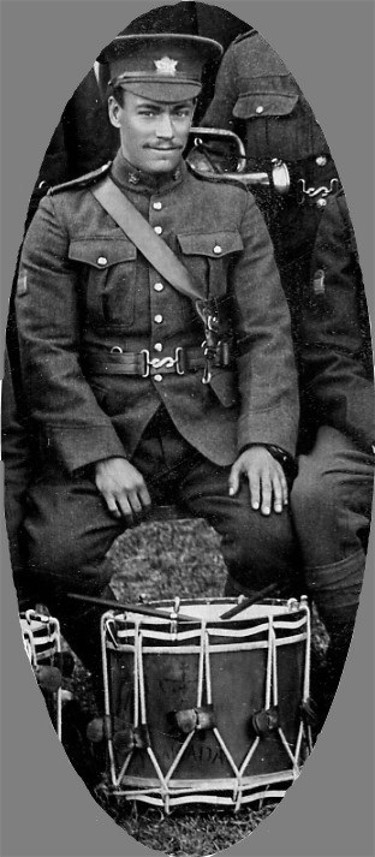|
Apr 21, 1889
|
Born in London, England to
George Thomas and Annie (nee Diett) Hussey
|
|
May 2, 1907
|
Embarked the SS Kensington in
Liverpool with his parents and siblings
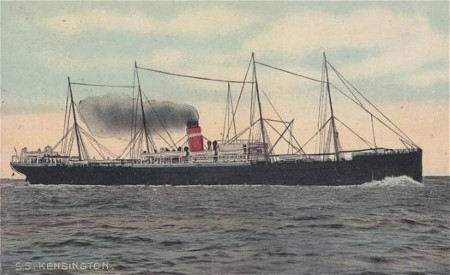
|
|
May 13, 1907
|
Disembarked in Montreal,
Quebec
|
|
Jan 17, 1914
|
Married to Elizabeth “Lizzie”
Fanny Harwood in Port Hope, Ontario.
His occupation is listed as Shipper
|
|
Dec 28, 1914
|
Attested into the 21st
Battalion CEF in Kingston, Ontario
Ø Number 59196
Ø Next of kin given
as Mrs. Elizabeth Hussey, wife, Port Hope, Ontario
Ø Previous occupation
given as Labourer
Ø Previous military
experience given as 2 years in the 5th Royal Highlanders
Ø Religion given as
Church of England
Ø Assigned to the
Depot Company
o Employed as a
drummer in the Bugle Band then later as a drummer in the Pipe Band
The battalion trained in the
Kingston area through the winter with headquarters in the Kingston Armouries
|
|
May 6, 1915
|
Embarked the RMS Metagama in
Montreal, Quebec
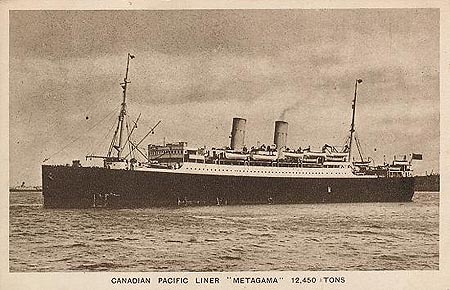
|
|
May 15, 1915
|
Disembarked in Devonport,
England and the battalion proceeded to the West Sandling Camp, near Hythe,
Kent to continue training
|
|
Sep 14, 1915
|
Embarked the St. Seiriol in
Folkestone
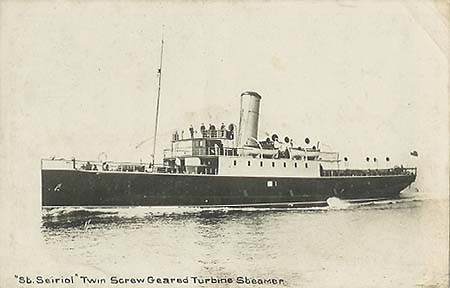
|
|
Sep 15, 1915
|
Disembarked in Boulogne,
France and the battalion proceeded to St. Omer
|
|
Aug 13, 1916
|
Admitted to the No. 6 CFA
(Canadian Field Ambulance) with a diagnosis that reads PUO (Pyrexia of
Unknown Origin) or more commonly called Trench Fever
|
|
Aug 16, 1916
|
Transferred to the 2nd
Division Rest Station at the No. 5 CFA
|
|
Aug 19, 1916
|
Discharged to duty from the
rest station
|
|
Dec 28, 1916
|
Awarded the Good Conduct Badge
|
|
Jan 18, 1917
|
Granted 10 days leave
|
|
Sep 12, 1917
|
Granted 10 days leave
|
|
Sep 24, 1917
|
Rejoined the battalion from
leave
|
|
Feb 13, 1918
|
Medical Board classified him
B2, meaning that he was fit for base duty only
|
|
Mar 14, 1918
|
Posted to the 2nd
Canadian Division Employment Company to be employed as a Bandsman and SOS
(Struck Off Strength) the 21st Battalion
|
|
Mar 25, 1918
|
Admitted to the No. 6 CFA with
a diagnosis that reads Bronchitis
|
|
Mar 26, 1918
|
Transferred to the No. 2 CFA
|
|
Mar 27, 1918
|
Transferred to the No. 23, CCS
(Casualty Clearing Station)
|
|
Mar 29, 1918
|
Transferred via No. 42 AT
(Ambulance Transport) and admitted to the No. 7 Stationary Hospital in Havre
|
|
Apr 3, 1918
|
Transferred to the No. 7
Convalescent Depot in Boulogne
|
|
Apr 5, 1918
|
Transferred to the No. 10
Convalescent Depot in Ecault
|
|
Apr 14, 1918
|
Admitted to the No. 5 CFA Rest
Camp
|
|
Apr 16, 1918
|
Transferred to the CGBD
(Canadian Garrison Base Depot)
|
|
Jun 7, 1918
|
Transferred to the CIBD
(Canadian Infantry Base Depot) for duty
|
|
Aug 29, 1918
|
After leaving the base depot
he joined the Canadian Labour Pool for duty
|
|
Sep 2, 1918
|
Medical classification changed
to read TB (Temporary Base) meaning he was temporarily unfit for front line
duty
|
|
Sep 8, 1918
|
Admitted to the No. 7 Canadian
General Hospital in Etaples with a diagnosis that reads Albuminuria. (an indication of kidney disease). After evaluation he was transferred to the
No. 6 Convalescent Depot
|
|
Sep 15, 1918
|
Invalided to England aboard
the Hospital Ship Newhaven
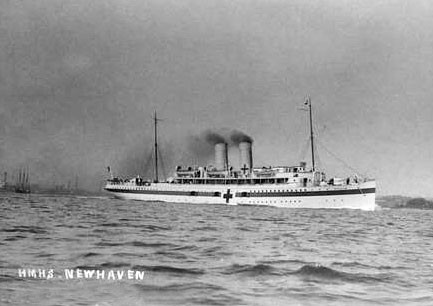
On arrival in England he was
admitted to the Fort Pitt Military Hospital in Chatham
Posted to the General Depot in
Shorncliffe for pay purposes while in hospital
|
|
Sep 17, 1918
|
Transferred to the Malloy
House VAD (Volunteer Aid Detachment) Hospital to continue his recovery
|
|
Oct 23, 1918
|
Transferred to the Wood Cote
Park Convalescent Hospital in Epsom
|
|
Jan 10, 1919
|
Discharged from hospital and
granted sick leave until January 22, 1919.
On completion of his leave he was ordered to report to the General
Depot in Witley
|
|
Feb 15, 1919
|
Transferred to the CCC
(Canadian Concentration Camp) Witley pending return to Canada
|
|
Feb 25, 1919
|
Embarked the SS Megantic in
Liverpool
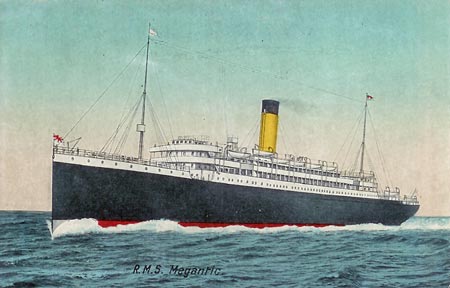
|
|
Feb 27, 1919
|
Admitted to the ship’s
infirmary with a diagnosis that reads Scabies
|
|
Mar 3, 1919
|
Released from the infirmary
|
|
Mar 5, 1919
|
Disembarked in Halifax, Nova
Scotia and proceeded to Kingston, Ontario
|
|
Mar 22, 1919
|
Admitted to the Ongwanada
Military Hospital in Kingston with a diagnosis that reads Scabies
|
|
Apr 21, 1919
|
Transferred to the Queen’s
University Military Hospital in Kingston and in addition to the Scabies is
noted as being Anemic
|
|
May 24, 1919
|
Medical Board notes:
Ø Patient complains
of weakness
Ø He is unable to do
heavy work
Ø X-Ray shows lesion
in his heart
Ø Board recommends
discharge as Medically Unfit for further service
|
|
May 28, 1919
|
Discharged to duty from
hospital
|
|
May 31, 1919
|
Discharged from the CEF in
Kingston, Ontario
Ø Rank on discharge
Private
Ø War Service Badge
Class “A” issued number 277746
Ø War Service Badge
Class “B” issued number 55715
Ø Proposed residence
on discharge 11 Charles St., Kingston
Following his discharge the
1914-15 Star, British War Medal and Victory Medals were sent to him at 11
Lower Charles St., Kingston
|
|
From
the summer 1936 edition of the Communiqué
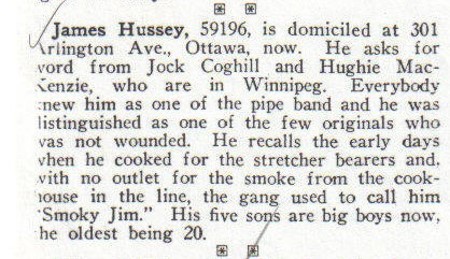
|
|
Jul 8, 1957
|
James Hussey died of a heart
attack in Ottawa, Ontario and was buried in the Pinecrest Cemetery, Ottawa
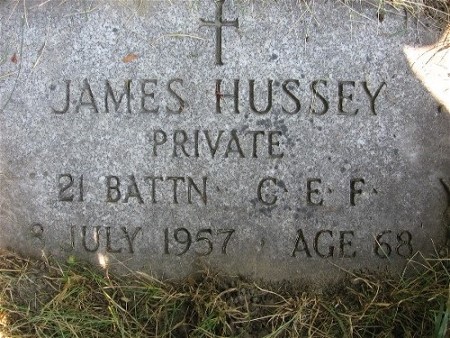
His death was attributed to
his wartime service and the Memorial Cross was issued to his widow, Mrs.
Elizabeth Hussey, 6 Galt St., Ottawa, Ontario. There was no Memorial Cross issued to his
mother as she had predeceased him
|
|
From
the summer 1957 edition of the Communiqué
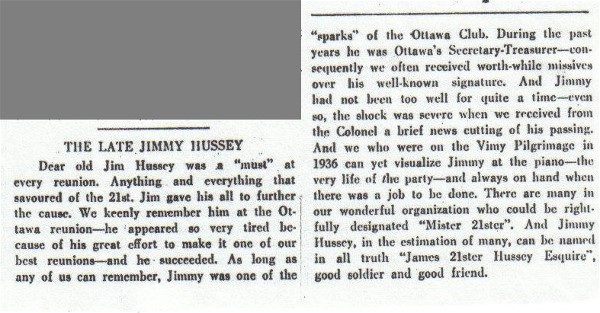
|
